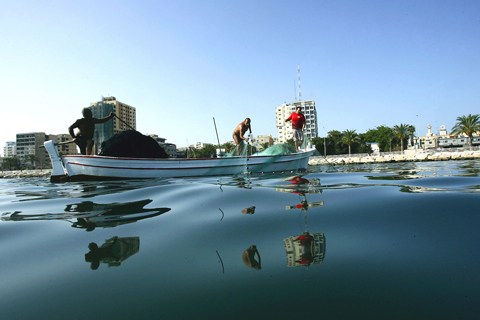Mustapha Shaalan yearns for the days when he would go out to sea and haul in 40kg of fish in the blink of an eye.
Nowadays, like most fishermen in this southern Lebanese coastal town and elsewhere in the country, he says he is lucky if he reels in one or two kilos on a good day.
Over-fishing, pollution and dynamite fishing have all but wiped out marine life in the Mediterranean waters off the 220km long Lebanese coast, leaving many of the country’s estimated 8,000 fishermen destitute.

PHOTO: AFP
“The sea back in the 1960s, 70s and 80s was thick with fish and we were the envy of the town,” 68-year-old Shaalan wistfully recalls, sitting on the quay of the picturesque port of Tyre.
“Our reputation extended worldwide,” said the father of seven who began fishing at age 10 and has a deeply creased, suntanned face from years spent at sea. “My pockets were always full and I traveled a lot. Now, look at us.”
Some 2,000 families live from fishing in Tyre, a city of 100,000 located near the border with Israel, says Khalil Taha, head of the local fishermen’s syndicate.
In the city’s heyday, a fisherman would easily earn US$500 a week, but that figure is now closer to US$200 for an entire month, well below the minimum wage of US$333, Taha said.
“The fishermen of Tyre used to do so well that when they would be offered jobs elsewhere they would turn them down,” he said. “My father used to earn enough from the trade that he was able to put me and my nine brothers and sisters through private school.”
”We used to go and buy our clothes at Nouveautes Khater, an upscale department store,” said Taha, 49, who has two children and is expecting a third. “Now even the cheapest place is expensive for us.”
Taha partly blames the fishermen themselves for their plight but also consecutive governments, which he said have done nothing to protect the fishing industry or help develop it.
Compounding the problem is the constant political turmoil that has rocked Lebanon for years. There was the 1975-1990 civil war, there were Israeli troops in southern Lebanon — including in Tyre — between 1982 and 2000 and, most recently, the devastating 2006 war between Hezbollah and Israel.
“We have been sounding the alarm for more than 10 years about our disastrous situation but no one is listening and I don’t think anyone ever will,” Taha said.
Experts say many species, including red mullet, grouper and small barracudas are facing extinction in Lebanon’s waters, primarily because of bad fishing practices over the years.
“We are destroying our sea, completely and totally,” said Imad Saoud, an aquatic scientist at American University of Beirut. “And the problem is that the people who benefit the most from the sea — the fishermen — are the people destroying it the most.”
He said the illegal and destructive practice of dynamite or blast fishing, spear fishing and compressor fishing, has irreversibly damaged the marine ecosystem off the coast of Lebanon.
Compressors blow air into crevices or holes at the sea bottom, frightening fish out of their hiding places.
Sewage is also dumped at sea along with heavy metals from factories, including copper, zinc and vanadium — a metallic chemical.
In addition, greedy developers have been invading the coastline and paying no heed to the environmental impact.
“The state of the Mediterranean in Lebanon is disastrous at all levels and what is coming is even more disastrous,” said Michel Bariche, a marine biologist at American University of Beirut.
“As far as the government is concerned, even if there is a will to do something, they lack the proper know-how,” he said. “Even if we scientists draw up solutions, there is no chance they will be implemented.”
Bariche said he has been working directly with fishermen to convince them to create marine reserves or protected areas or risk losing their livelihood.
“We need to convince them that these reserves are for their own good, otherwise there will soon be nothing left to fish,” he said.
Most of the fish caught in Lebanon come from Israel and Egypt as drifting larvae, since the currents flow north. Lebanon also imports seafood from Turkey, Egypt and countries in the Gulf region.
Ironically, Taha said, when Israel had its troops stationed in southern Lebanon, there were more fish to catch as fishermen were not allowed to go out to sea at night.
“After the Israelis withdrew, the fishermen went out day and night, leaving no room for the fish to breath,” he said. “A fish can’t lift its head out of the water here without having 20 fishermen go after it.”
Dahej el-Mokdad, head of the department of fisheries and wildlife at the ministry of agriculture, acknowledged that new ground rules are needed on how fishing is conducted in Lebanon but said lack of funds and political bickering have hampered progress.
“We don’t have the means to do our job,” he said. “We don’t even have patrol boats and no one considers our sea as a national treasure.”

Philippine President Ferdinand Marcos Jr has fired his national police chief, who gained attention for leading the separate arrests of former Philippine president Rodrigo Duterte on orders of the International Criminal Court and televangelist Apollo Carreon Quiboloy, who is on the FBI’s most-wanted list for alleged child sex trafficking. Philippine Executive Secretary Lucas Bersamin did not cite a reason for the removal of General Nicolas Torre as head of the 232,000-member national police force, a position he was appointed to by Marcos in May and which he would have held until 2027. He was replaced by another senior police general, Jose

STILL AFLOAT: Satellite images show that a Chinese ship damaged in a collision earlier this month was under repair on Hainan, but Beijing has not commented on the incident Australia, Canada and the Philippines on Wednesday deployed three warships and aircraft for drills against simulated aerial threats off a disputed South China Sea shoal where Chinese forces have used risky maneuvers to try to drive away Manila’s aircraft and ships. The Philippine military said the naval drills east of Scarborough Shoal (Huangyan Island, 黃岩島) were concluded safely, and it did not mention any encounter with China’s coast guard, navy or suspected militia ships, which have been closely guarding the uninhabited fishing atoll off northwestern Philippines for years. Chinese officials did not immediately issue any comment on the naval drills, but they

POWER CONFLICT: The US president threatened to deploy National Guards in Baltimore. US media reports said he is also planning to station troops in Chicago US President Donald Trump on Sunday threatened to deploy National Guard troops to yet another Democratic stronghold, the Maryland city of Baltimore, as he seeks to expand his crackdown on crime and immigration. The Republican’s latest online rant about an “out of control, crime-ridden” city comes as Democratic state leaders — including Maryland Governor Wes Moore — line up to berate Trump on a high-profile political stage. Trump this month deployed the National Guard to the streets of Washington, in a widely criticized show of force the president said amounts to a federal takeover of US capital policing. The Guard began carrying

Ukrainian drone attacks overnight on several Russian power and energy facilities forced capacity reduction at the Kursk Nuclear Power Plant and set a fuel export terminal in Ust-Luga on fire, Russian officials said yesterday. A drone attack on the Kursk nuclear plant, not far from the border with Ukraine, damaged an auxiliary transformer and led to 50 percent reduction in the operating capacity at unit three of the plant, the plant’s press service said. There were no injuries and a fire sparked by the attack was promptly extinguished, the plant said. Radiation levels at the site and in the surrounding